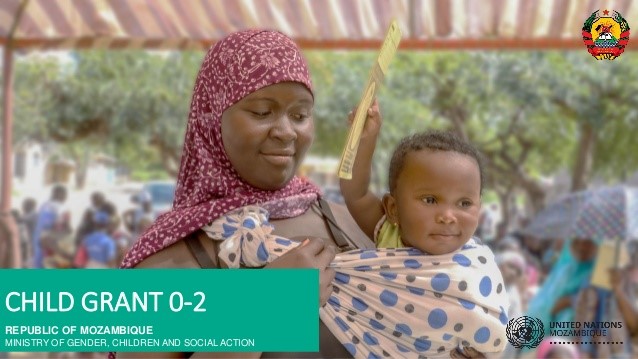Santana Momade, the ICDP Mozambique representative reports:
According to recent analysis by the Ministry of Economy and Finance of Mozambique and UNICEF, half of all children in Mozambique live in monetary poverty. Almost one in two Mozambican children are considered multidimensionally poor. Using comparable data of DHS and the Alkire-Foster approach, multidimensional child poverty in Mozambique was found to exceed that of neighbouring countries (E-Swatini, Malawi, South Africa, Tanzania and Zimbabwe). The Mozambique National Basic Social Security Strategy (2016-2024) developed the Child Grant as part of the Basic Social Subsidy Programme that aims to reduce children’s vulnerability, promote their development by improving their health and diet and accessing basic social services and protection.
UNICEF supported the design and launch of the pilot phase of the Child Grant, ensuring full ownership by the Government. The Child Grant has two components: a cash subsidy (approximately US$10 per month) and a care component (nutrition package and case management) linked to social services. The case management is also called Acompanhamento Familiar and consists of the support provided to families affected by situations of specific risk and/or to those who are classified as most vulnerable, in line with the results from a basic screening tool (used in pre-enrolment or identification). The case management model follows the policies and instruments approved by the Ministry of Gender, Children and Social Action (MGCAS). Regular home visits are conducted by case workers to offer direct support to primary caregivers, their children and other members of the households (e.g, psychosocial and counselling or information for parents) as well as to facilitate referrals to community and statutory services. Through Acompanhamento Familiar a beneficiary family is followed for a period of six months of intervention and three additional months to check on the sustainability of the results achieved. To implement the case management component, UNICEF, in consultation with the Ministry of Gender, Children and Social Action (MGCAS), identified a need for technical assistance and day-today on-the-job coaching of government technical staff and Permanentes (volunteers) at Provincial (DPGAS) and District level (SDMAS) of MGCAS, with the ultimate aim of leaving a cadre of social welfare officers able to provide quality case management support to vulnerable families and children and those at risk, within the context of the child grant (0-2 years).
UNICEF invited ICDP Mozambique to provide this technical and coaching support, following extensive hands-on experience in Mozambique in psychosocial support and, more recently, (child protection) case management. The technical support from ICDP focuses on:
i) support to the development and adaptation of case management tools, job aids, training packages and materials for relevant case management actors and programme stakeholders;
ii) through on-the-job coaching of relevant provincial staff, strengthen their role in monitoring and supervising the work at district level; and
iii) through on-the-job coaching of relevant district staff, strengthen their ability to monitor and supervise the work of the volunteers and to provide quality case management for child protection cases.
COVID – 19 Challenge
The programme is facing important challenges due to the COVID-19 outbreak, especially because the Acompanhamento Familiar component was designed based on a home-visit approach. Currently, the recommendations are:
1. Before conducting any visit, consider whether a face-to-face visit is necessary. If not, alternatively the case worker can speak to the family by phone. If someone in the family is unwell, do not conduct the home visit; instead, advise and support them through the referral pathways.
2. The case worker must:
a) Maintain social distancing; b) Wash/sanitize the hands before, during and after each visit; c) Avoid touching eyes, nose and mouth before, during and after each visit; d) Wear a mask (new one for each visit).

